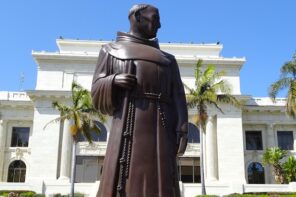Ireland is the most beautiful paradox. We have a centuries-long tradition of hospitality to the stranger, yet we have been pretty terrible at resolving our differences with each other. (Until, that is, we became rather brilliant at it, developing and implementing one of the most conciliatory political agreements.)
Our conservative religion tore families apart, as Catholics and Protestants, North and South, were inhibited or even forcibly prevented from marrying; yet the deep roots and fertile soil of Celtic spirituality nurture a personal and community wholeness that is certainly not bound by puritanical notions of who is “in”and who is “out.”
The loudest religious voices in the North nurtured enmity between people who might otherwise have been good neighbors; and in the South, sought to control the bodies of people who had recently fought a war of liberation. But we also gave birth to the light-bearing poetry of Seamus Heaney, the enormous communal (and global) creative activist excitement of U2, and in Sinead O’Connor, a poet-prophet-priest who has been a scapegoat for the things we’re not willing to face in ourselves, a voice for the voiceless, and a healer herself.
So I don’t buy the notion that the recent same-sex marriage referendum, won with 62 percent of the electorate affirming the right of any two adults to form such a partnership, signals that only now have the Irish people suddenly become open-minded and progressive. Many Irish people always had open hearts. What has changed is that the public power structures have shifted.
Over the last 20 years, the credibility of the Catholic hierarchy was radically undermined by evidence of how terribly they had dealt with the abusive behavior of some priests, and how they had utterly failed to deal with the impact of this behavior on victims and survivors. But there had been rumblings of discontent for some time—the church had been proven wrong on so many social and cultural issues where compassion is necessary (divorce, the criminalization of homosexual acts) that the abuse scandal was not the origin of the collapse of Christendom’s hold over the state, but rather its tipping point.
Things are different in the North—nearly 50 years of the current iteration of sectarian conflict has, in the words of my colleague Conflict Studies professor John Brewer, “brutalized” religion. It is natural to occupy a defensive posture when you feel you’re being attacked; when people are literally being killed for their perceived religion, the posture is only entrenched.
It takes conscious and intentional leadership to overcome fear-based religion; no easy task when those who want to become such conscious and intentional leaders might themselves be targeted—for intimidation by people who have been willing to use physical violence, and for career destruction by those within religious structures whose violence is of the bureaucratic kind.
So public attitudes continue to move toward the affirmation of LGBT people, and this is partly an example of the public reaction to how clearly institutional religion has failed to meet the needs or answer the questions most of us have. Religion in the Republic of Ireland cannot avoid this any more, and even the Archbishop of Dublin says that he knows the Church needs a “reality check.”
In the North, however, where space to talk about these things was squeezed out for so long by the Troubles, we’ve only just begun to have a public conversation about pluralism, and hardly even started to talk about the possibility that LGBT people might already be in our churches, gifted to contribute in ways that might help heal us all.
What to do about this is not obvious. If, as Friar Richard Rohr (another example of how radically progressive thinking and institutional affiliations are not mutually exclusive) says, oppositional energy always recreates itself, then merely slamming damaging religious forms isn’t going to advance much in the way of beloved community.
But if, as Rohr also says, “the best criticism of the bad is the practice of the better,” then Ireland’s ethically sensitive activists—of all faiths and none—have a beautiful opportunity.
It’s simple—the best that we know of Irishness centers on one noble and vital gift: hospitality. Céad mile fáilte, we say— “a hundred thousand welcomes.”
The invitation being offered to Ireland’s spiritually committed individuals and communities (and offered by Ireland to the world) is to open, open, and open more.
Hospitality to the stranger—and to our neighbors.
Hospitality to familiar practices and rituals that, when dusted off and renewed for the contemporary moment, will womb us into community.
Hospitality to the idea that there are still things we have to learn, and that nature and experience—the two cornerstones of Celtic spirituality—may be revealing things about what it is to be human that not only challenge previously unquestioned notions, but could hold within them the key to healing not just the marginalized, but even those who have believed that power over others was their birthright.
Beloved community nurtured in the presence of Celtic spirit has always been nascent in Ireland. When two-thirds of the people reject dehumanizing dogma in favor of celebrating human gifts, and do so without rejecting the notion of religious practice, it might be a moment when such a beloved community can be fully born.





